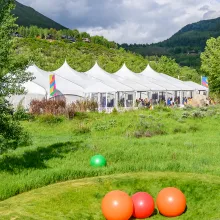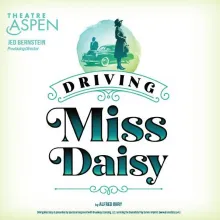July 3rd
Robert Spano conductor
Renée Fleming soprano
Rod Gilfry baritone
KEVIN PUTS: The Brightness of Light
PROKOFIEV: Scenes from Romeo and Juliet, op. 64
Headlined by star soprano Renée Fleming, this gorgeous and sensuous program charts the romantic journeys of two famous pairs of lovers. Pulitzer-Prize-winner Kevin Puts’s The Brightness of Light is an expansion of Letters to Georgia, written for and premiered by Fleming. The original set was built around letters from O’Keefe to the photographer Alfred Stieglitz. At Fleming’s suggestion, Puts added an equal part for Stieglitz, sung here by two-time Grammy nominee, singer, and actor Rod Gilfry. The text chronicles their relationship from first encounter to love and marriage, ending in breakup and Stieglitz's death. Puts’s colorful orchestration captures the beauty and vastness of the New Mexican landscape and the light which was such an inspiration for O’Keefe’s paintings.
Also on the program are selections from Prokofiev’s soaring Romeo and Juliet ballet score. The Kirov Ballet commissioned the piece, but dropped the project before Prokofiev had written a note. The composer turned around and signed a contract with the Bolshoi Ballet, who then rejected the score as “undanceable.” Eventually, the Kirov produced the ballet after all, but Prokofiev continued to tinker with the score, saying he had "taken special pains to achieve a simplicity which will, I hope, reach the hearts of all listeners." Come hear the lush, romantic melodies and vibrant orchestration in this powerful depiction of Shakespeare’s ultimate love story, and see why Prokofiev was so hopeful about the work’s success.
Be swept away by musical romance as the Aspen Festival Orchestra makes its season debut.
July 10th
Ludovic Morlot conductor
Inon Barnatan piano
SHELLEY WASHINGTON: Back (World Premiere)
RACHMANINOFF: Rhapsody on a Theme of Paganini, op. 43
---
BRAHMS: Symphony No. 4 in E minor, op. 98
July 17th
John Storgårds conductor
Gil Shaham violin
Sterling Elliott cello
KAIJA SAARIAHO: Ciel d’hiver
BRAHMS: Concerto for Violin and Cello in A minor, op. 102
SIBELIUS: Symphony No. 6 in D minor, op. 104
Gil Shaham returns! His impeccable technique, inimitable warmth, and infectious joy in music-making have made him one of the foremost violinists in the world. He'll be joined by rising cello star Sterling Elliott, a 2021 Avery Fisher Career Grant recipient and winner of the Senior Division of the 2019 National Sphinx Competition, for Brahms's ravishing Double Concerto. Brahms and the violinist Joseph Joachim were close friends, and Brahms even composed his famous – and only- violin concerto for him. Things went sour when Joachim accused his wife of infidelity, and Brahms sided with her during the divorce. Brahms eventually reached out to Joachim by floating an idea of a concerto for violin and cello. The piece worked to reconcile the two, and is very much like a conversation between two friends, ranging from playful to competitive, sweet to gruff. The slow movement has one of the most gorgeous melodies of all time, and the infectious gypsy-inspired finale will make you want to dance.
Finnish composer Kaija Saariaho is best known in the U.S. for her opera “L’amour de loin,” which received acclaim at The Metropolitan Opera several years ago. Le Ciel d’Hiver is an adaptation of the middle movement of her symphonic work Orion. She depicts that constellation by passing a brief melody around the various instruments of the orchestra in the manner of stars crossing the sky. Enter a hypnotic, spectral world as the piano part glistens mysteriously and the woodwinds add to the ethereal mood.
Another Finnish composer, Jean Sibelius, appears on the program with one of his most serene and optimistic works. Like Beethoven’s Sixth Symphony, Sibelius’s Sixth can also be considered his “Pastoral Symphony.” Even the tempi are cheerful, with no slow movement at all.
Experience the “thrill of Gil” and a wide-ranging sonic journey to Finland with this exhilarating program.
July 24th
Lionel Bringuier conductor
Diana Adamyan violin
KHACHATURIAN: Violin Concerto
RAVEL: Alborada del gracioso
RAVEL: Rapsodie espagnole
RAVEL: La valse
Diana Adamyan is quickly gaining an international reputation as one of her generation's most outstanding violinists. Born in Armenia, she won First Prize at the 2018 Yehudi Menuhin International Competition and First Prize in the 2020 Khachaturian Violin Competition. In her Aspen debut, she takes on Dvorak’s only Violin Concerto. This brilliant virtuoso work incorporates folk music of the composer’s homeland, and is filled with graceful melodies and dance rhythms along with flamboyant passages for the soloist.
July 31st
Robert Spano conductor
Augustin Hadelich violin
BRIAN RAFAEL NABORS: Onward
SIBELIUS: Violin Concerto in D minor, op. 47
MAHLER: Symphony No. 1 in D major
The Milwaukee Shepherd Express conjectured that he “well may be the best violinist in the world. [His] gorgeous sound is ample and rich always. Every detail is played with perfectly clear
intent.”
Augustin Hadelich’s astonishing technique, eloquent phrasing, and seeming effortlessness have consistently made his performances highlights of the AMFS season. From its haunting opening to its astonishing virtuosic finale, the Sibelius Violin Concerto as played by Hadelich is sure to keep you enthralled.
“It came gushing out like a mountain torrent,” said Mahler of his First Symphony. Written for a huge orchestra and full of youthful Romanticism, the work follows the journey of Mahler’s “hero” through episodes of optimism, struggle, death, and ultimately triumph.
Onward by Brian Nabors opens the program. Not unlike Mahler’s First, the work is, in the composer’s words, “an homage to the triumphs and growth we experience along the epic journey of life.”
Hear the extraordinary Augustin Hadelich in a violin masterwork and experience the power and richness of the orchestra as it takes you on two musical journeys.
August 7th
Vasily Petrenko conductor
Alexander Malofeev piano
RACHMANINOFF: Piano Concerto No. 2 in C minor, op. 18
WAGNER: Prelude and Liebestod, from Tristan und Isolde
SKRYABIN: The Poem of Ecstasy, op. 54
Two Russian blockbusters and a treasured iconic interlude make up this sublime and sensuous program.
At only 20, Alexander Malofeev is already a big name in Europe and China. His YouTube channel has almost 80,000 subscribers. Winner of numerous international awards, Malofeev became interested in music of Tchaikovsky, Shostakovich, Mahler, Rachmaninov, and Prokofiev by the time he was 7. Hear him take on Rachmaninoff’s Second Piano Concerto, the result of a successful course of hypnotherapy after a long compositional dry spell. Rachmaninoff dedicated the piece to Dr. Dahl, probably the only hypnotherapist to receive such an honor from a major composer. The mood ranges from turbulent drama to rapturous lyricism, with a fair share of thrilling pianistic effects from start to spectacular finish. Truly effective therapy!
Wagner’s graphic portrayal of the lovers’ frustrated passion in Tristan und Isolde was considered scandalous, and his revolutionary harmonic language turned the music world upside down and paved the way for twentieth century music. The Prelude and Liebestod bring us both the beginning and the end of the five-hour long opera and have become concert favorites
Scriabin earned a cult following in the 1960s and early 1970s, connecting with a counterculture of mysticism and psychedelic drugs. In his 1945 book Nexus, Henry Miller wrote, “Scriabin’s music sounds like I think — sometimes. Has that far-off cosmic itch. Divinely fouled up. All fire and air. . . . It was like a bath of ice; cocaine, and rainbows.” Scriabin wrote a poem called “Orgiastic Poem,” but his publisher forced him to change it to its more ambiguous title, The Poem of Ecstasy. He composed the massive orchestral piece to bring together poetry and music, which he considered the highest art form. Let this lush music overwhelm your senses – as Scriabin intended it to do. You may even see colors, as Scriabin himself did with sound.
A dazzling soundscape awaits you in this spectacular program.
August 14th
Thomas Wilkins conductor
Joyce Yang piano
JAMES LEE III: Amer'ican
PROKOFIEV: Piano Concerto No. 3 in C major, op. 26
DVOŘÁK: Symphony No. 9 in E minor, op. 95, “From the New World”
Wherever Joyce Yang plays, there are rave reviews: “A knockout performance,” exclaimed The New York Times. Said BBC Music Magazine, “the precision of the fingerwork is astounding.” The Washington Post noted “her agility, balance and velocity.” AMFS alumna and pianist extraordinaire Joyce Yang returns to Aspen for a performance that is sure to exhilarate. Thrill to the pianistic pyrotechnics in Prokofiev’s Third Piano Concerto, which stands high on the list of virtuosic showpiece concertos.
Long before “world music” became popular, Dvořák composed his beloved Ninth Symphony, a work which Leonard Bernstein described as “truly multinational in its foundations.” Drawing on rhythms from his native Bohemia and inspired by the folk melodies, African-American spirituals, and wide open spaces of the United States, Dvořák created an enduring masterpiece which was an immediate triumph at its 1893 Carnegie Hall premiere. The work also introduced listeners to the music of black Americans. A generation before jazz came into being, Dvorak wrote, "They are the songs of America and your composers must turn to them. In the negro melodies…I discover all that is needed for a great and noble school of music. They are heartbreaking, tender, passionate, melancholy, solemn, religious, bold, merry, gay, gracious or what you will. It is music that suits itself to any mood or purpose. There is nothing in the whole range of composition that cannot find a thematic source here.”
Welcome the return of one of the most exciting pianists of her generation, and hear the symphony that Neil Armstrong brought with him on the way to the moon in 1969.
Also available to view in a free livestream on the AMFS Virtual Stage.
August 21st
Robert Spano conductor
Zach Borichevsky tenor
Seraphic Fire Professional Choral Institute
Patrick Dupré Quigley program director
Kantorei
Joel Rinsema chorus director
BERLIOZ: Grande messe des morts, op. 5
The season finale offers a monumental, rarely performed work designed for a 188-piece orchestra a 210-member chorus. Berlioz wrote his Requiem for a huge cathedral in Paris whose vaulted nave and galleries above its side aisles presented acoustical challenges, but whose size allowed for massive performing forces. It was composed after a disappointing experience at St. Peter’s in Rome, where Berlioz expected to hear a chorus of thousands praising God, supported by a thundering organ. Instead he was met an 18-voice choir and a chamber organ on wheels.
Berlioz sought to create a profound communal experience, “mankind gathered together on the last day,” and one by which the listener would be “shaken to the depths of his soul.” The audience had to feel the sound –something 400 performers could accomplish.
The Requiem’s premiere was an enormous success. Berlioz wrote to his father two days after the performance, “We, too, captured Constantine the day before yesterday, the Constantine of music!… Since yesterday I’ve received I don’t know how many letters of congratulation; I can’t possibly describe to you how excited all my friends are. There’s no question but that [the Requiem] made an extraordinary impact.”
Top off the season with a full-throated work that combines the dramatic and the spiritual in a colossal ocean of sound.
Also available to view in a free livestream on the AMFS Virtual Stage.
The premier training ground for hundreds of the worlds' most talented young musicians, the Aspen Music Festival and School presents hundreds of events during the Festival, which runs June 30 to August 21. To learn more and for a full season calendar, including daily free events, visit aspenmusicfestival.com/events.





